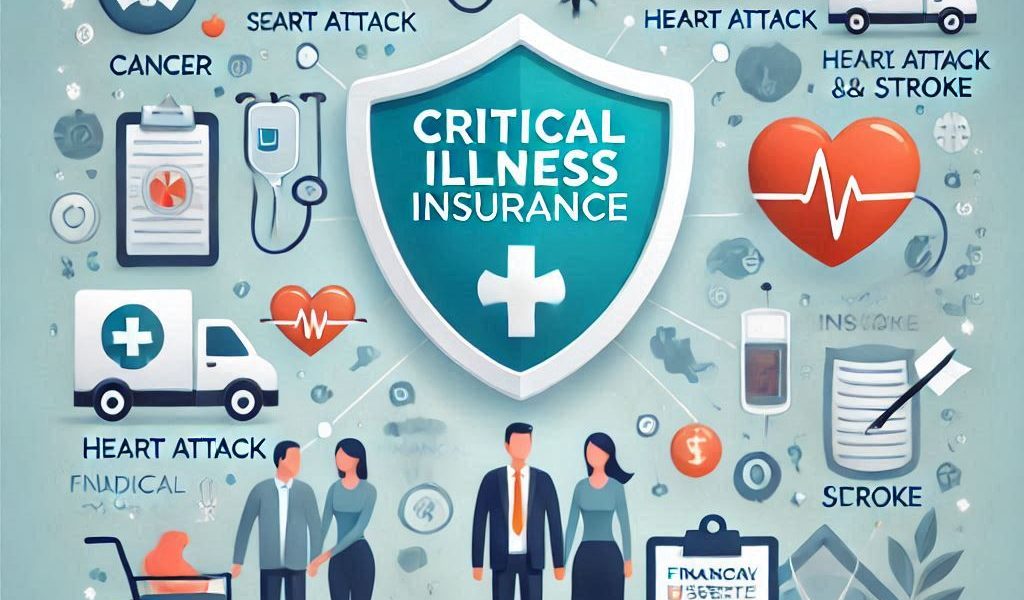Critical illness insurance is a type of coverage that offers financial protection in the event of serious illnesses such as cancer, heart attack, stroke, or other life-threatening conditions. While your health insurance or life insurance might cover a portion of the medical expenses, critical illness insurance provides a lump sum payment to help you manage the financial impact of a serious illness. In this blog, we’ll explore what critical illness insurance is, why it may be beneficial, and how to determine if you need it.
What is Critical Illness Insurance?
Critical illness insurance is a policy that provides a one-time, lump sum payment if you are diagnosed with a critical illness covered by the policy. This could include illnesses such as:
- Cancer
- Heart attack
- Stroke
- Kidney failure
- Organ transplant
- Multiple sclerosis
- Paralysis
The amount paid is tax-free and can be used for a variety of purposes, such as paying for treatment, covering living expenses, or reducing debt. This financial support allows you to focus on recovery without the added burden of financial stress.
Why Is Critical Illness Insurance Important?
1. Provides Financial Security During Difficult Times
Being diagnosed with a serious illness can lead to unexpected medical bills and a loss of income, especially if you’re unable to work. Critical illness insurance offers peace of mind by helping you cover these expenses during your treatment and recovery period.
Example: If you experience a heart attack and need several months to recover, you may be unable to work, leading to lost wages. Critical illness insurance provides a lump sum to help you maintain your financial stability during this challenging time.
2. Covers Expenses Not Included in Health Insurance
Health insurance generally covers medical treatment, but it doesn’t always cover all costs associated with a critical illness. Critical illness insurance can help pay for additional expenses, such as:
- Experimental treatments
- Travel costs for medical care
- Home modifications (for disabilities caused by the illness)
- Caregiver costs
Example: While your health insurance may cover hospital stays and doctor visits, you may need additional funds for travel or home care, which critical illness insurance can help with.
3. Allows You to Focus on Recovery
Having critical illness insurance means you don’t have to worry about the financial burden while you recover. The lump sum payment can give you the flexibility to focus on getting better rather than stressing over bills, which can significantly improve your quality of life during treatment.
Example: Instead of worrying about bills or whether you can afford to take time off work, the insurance payout can allow you to focus fully on your recovery.
Types of Critical Illness Insurance
Critical illness insurance policies vary, so it’s essential to understand what each type covers and how it suits your needs.
1. Standalone Policies: Standalone critical illness insurance is a policy that specifically covers a variety of critical illnesses. This is a separate policy from your life insurance or health insurance. These policies are generally affordable, and the benefits are paid directly to the insured person.
2. Rider Policies: A rider is an add-on to your life insurance policy. It offers critical illness coverage as an additional benefit, and the premium is usually lower than a standalone policy. However, it may come with certain restrictions or limitations on the payout amount.
Example: If your life insurance policy already offers $100,000 in coverage, you can add a rider for critical illness insurance that will provide an additional payout if you’re diagnosed with a serious condition.
Benefits of Critical Illness Insurance
- Financial Protection in Case of Serious Illness:
Critical illness insurance provides a financial safety net, so you can handle medical costs and living expenses without draining your savings. - Flexibility:
The lump sum benefit allows you to use the money for anything you choose, such as seeking alternative treatments or paying for home care. - Helps with Early Detection:
Some policies offer coverage for early detection of critical illnesses, which can be a major factor in improving your chances of recovery. - Peace of Mind:
Knowing that you have a safety net can reduce stress and allow you to focus on your health rather than your finances.
Who Should Consider Critical Illness Insurance?
1. People with a Family History of Critical Illnesses: If cancer, heart disease, or stroke runs in your family, you may be more likely to develop one of these conditions. Critical illness insurance can offer peace of mind knowing you’re protected financially if you’re diagnosed with a covered illness.
2. Those Who Are Solely Responsible for Family Income: If you’re the primary breadwinner for your family, losing your ability to work due to illness can have a devastating impact on your family’s financial well-being. Critical illness insurance ensures that your family is financially protected while you focus on recovery.
3. Individuals with High Medical Costs: For people with high medical expenses or limited health insurance coverage, critical illness insurance provides extra financial support to cover gaps in your current health insurance policy.
4. People with High-Pressure Jobs or Unhealthy Lifestyles: Those with high-stress jobs or who engage in unhealthy lifestyle habits such as smoking or poor diet may be at an increased risk of developing serious health issues. Critical illness insurance can provide an added layer of protection for those at higher risk.
When Should You Consider Critical Illness Insurance?
Critical illness insurance is ideal for individuals who want extra financial protection in case they’re diagnosed with a serious condition. It’s especially beneficial if:
- You don’t have significant savings to cover potential medical expenses.
- You don’t have an emergency fund or would prefer to preserve your savings.
- You want to make sure your family won’t struggle financially if something unexpected happens.
If you’re in good health and have a solid financial cushion, you may not feel the need for critical illness insurance. However, it’s always a good idea to assess your personal situation and determine if you’re prepared for the unexpected.
How to Choose the Right Critical Illness Insurance Policy
When shopping for critical illness insurance, consider the following factors:
- Coverage: Review the illnesses covered by the policy and ensure they align with your personal and family health history.
- Payout Amount: Determine how much coverage you need based on your potential medical expenses and living costs.
- Premiums: Compare premiums across different insurers and ensure the policy fits within your budget.
- Policy Terms: Understand the terms, exclusions, and waiting periods of the policy before purchasing.
Conclusion
Critical illness insurance can provide vital financial support when you need it most. While it’s not for everyone, it’s an excellent choice for those who want to ensure they’re financially protected in the event of a serious illness. By understanding the benefits, types, and factors to consider when choosing a policy, you can make an informed decision about whether critical illness insurance is right for you.




